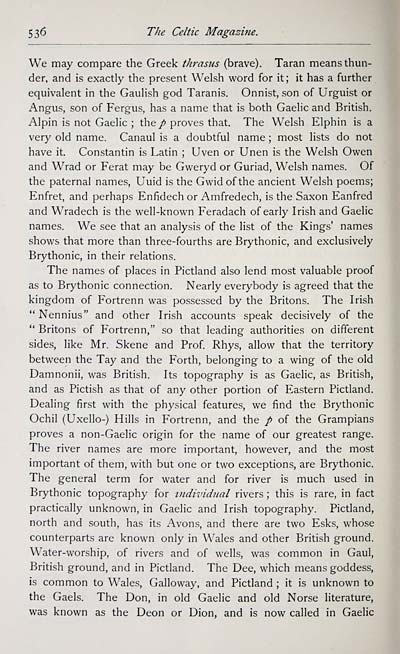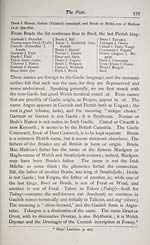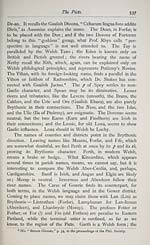Blair Collection > Celtic magazine > Volume 12
(546)
Download files
Complete book:
Individual page:
Thumbnail gallery: Grid view | List view

53^ The Celtic Magazine.
We may compare the Greek thrasiis (brave). Taran means thun-
der, and is exactly the present Welsh word for it; it has a further
equivalent in the Gaulish god Taranis. Onnist, son of Urguist or
Angus, son of Fergus, has a name that is both Gaelic and British.
Alpin is not Gaelic ; the/ proves that. The Welsh Elphin is a
very old name. Canaul is a doubtful name ; most lists do not
have it. Constantin is Latin ; Uven or Unen is the Welsh Owen
and Wrad or Ferat may be Gweryd or Guriad, Welsh names. Of
the paternal names, Uuid is the Gwid of the ancient Welsh poems;
Enfret, and perhaps Enfidech or Amfredech, is the Saxon Eanfred
and Wradech is the well-known Feradach of early Irish and Gaelic
names. We see that an analysis of the list of the Kings' names
shows that more than three-fourths are Brythonic, and exclusively
Brythonic, in their relations.
The names of places in Pictland also lend most valuable proof
as to Brythonic connection. Nearly everybody is agreed that the
kingdom of Fortrenn was possessed by the Britons. The Irish
"Nennius" and other Irish accounts speak decisively of the
" Britons of Fortrenn," so that leading authorities on different
sides, like Mr. Skene and Prof. Rhys, allow that the territory
between the Tay and the Forth, belonging to a wing of the old
Damnonii, was British. Its topography is as Gaelic, as British,
and as Pictish as that of any other portion of Eastern Pictland.
Dealing first with the physical features, we find the Brythonic
Ochil (Uxello-) Hills in Fortrenn, and the / of the Grampians
proves a non-Gaelic origin for the name of our greatest range.
The river names are more important, however, and the most
important of them, with but one or two exceptions, are Brythonic.
The general term for water and for river is much used in
Brythonic topography for individual rivers ; this is rare, in fact
practically unknown, in Gaelic and Irish topography. Pictland,
north and south, has its Avons, and there are two Esks, whose
counterparts are known only in Wales and other British ground.
Water-worship, of rivers and of wells, was common in Gaul,
British ground, and in Pictland. The Dee, which means goddess,
is common to Wales, Galloway, and Pictland ; it is unknown to
the Gaels. The Don, in old Gaelic and old Norse literature,
was known as the Deon or Dion, and is now called in Gaelic
We may compare the Greek thrasiis (brave). Taran means thun-
der, and is exactly the present Welsh word for it; it has a further
equivalent in the Gaulish god Taranis. Onnist, son of Urguist or
Angus, son of Fergus, has a name that is both Gaelic and British.
Alpin is not Gaelic ; the/ proves that. The Welsh Elphin is a
very old name. Canaul is a doubtful name ; most lists do not
have it. Constantin is Latin ; Uven or Unen is the Welsh Owen
and Wrad or Ferat may be Gweryd or Guriad, Welsh names. Of
the paternal names, Uuid is the Gwid of the ancient Welsh poems;
Enfret, and perhaps Enfidech or Amfredech, is the Saxon Eanfred
and Wradech is the well-known Feradach of early Irish and Gaelic
names. We see that an analysis of the list of the Kings' names
shows that more than three-fourths are Brythonic, and exclusively
Brythonic, in their relations.
The names of places in Pictland also lend most valuable proof
as to Brythonic connection. Nearly everybody is agreed that the
kingdom of Fortrenn was possessed by the Britons. The Irish
"Nennius" and other Irish accounts speak decisively of the
" Britons of Fortrenn," so that leading authorities on different
sides, like Mr. Skene and Prof. Rhys, allow that the territory
between the Tay and the Forth, belonging to a wing of the old
Damnonii, was British. Its topography is as Gaelic, as British,
and as Pictish as that of any other portion of Eastern Pictland.
Dealing first with the physical features, we find the Brythonic
Ochil (Uxello-) Hills in Fortrenn, and the / of the Grampians
proves a non-Gaelic origin for the name of our greatest range.
The river names are more important, however, and the most
important of them, with but one or two exceptions, are Brythonic.
The general term for water and for river is much used in
Brythonic topography for individual rivers ; this is rare, in fact
practically unknown, in Gaelic and Irish topography. Pictland,
north and south, has its Avons, and there are two Esks, whose
counterparts are known only in Wales and other British ground.
Water-worship, of rivers and of wells, was common in Gaul,
British ground, and in Pictland. The Dee, which means goddess,
is common to Wales, Galloway, and Pictland ; it is unknown to
the Gaels. The Don, in old Gaelic and old Norse literature,
was known as the Deon or Dion, and is now called in Gaelic
Set display mode to: Large image | Transcription
Images and transcriptions on this page, including medium image downloads, may be used under the Creative Commons Attribution 4.0 International Licence unless otherwise stated. ![]()
| Early Gaelic Book Collections > Blair Collection > Celtic magazine > Volume 12 > (546) |
|---|
| Permanent URL | https://digital.nls.uk/76467036 |
|---|
| Description | Volume XII, 1887. |
|---|---|
| Shelfmark | Blair.13 |
| Attribution and copyright: |
|
| Description | A selection of books from a collection of more than 500 titles, mostly on religious and literary topics. Also includes some material dealing with other Celtic languages and societies. Collection created towards the end of the 19th century by Lady Evelyn Stewart Murray. |
|---|
| Description | Selected items from five 'Special and Named Printed Collections'. Includes books in Gaelic and other Celtic languages, works about the Gaels, their languages, literature, culture and history. |
|---|

